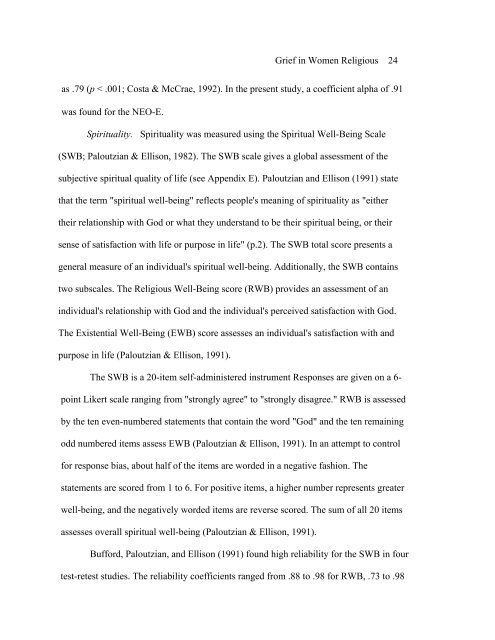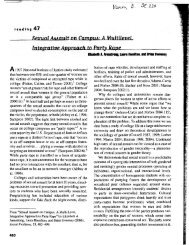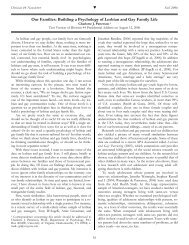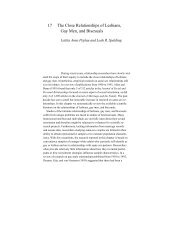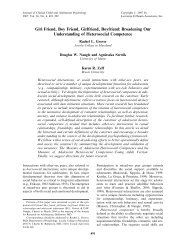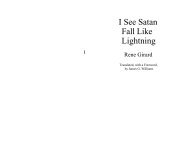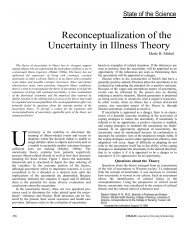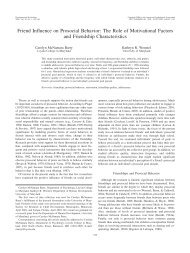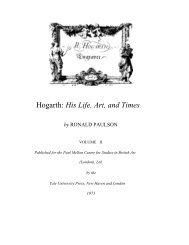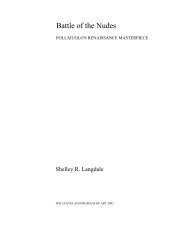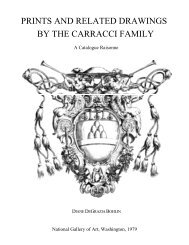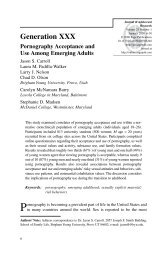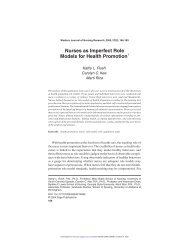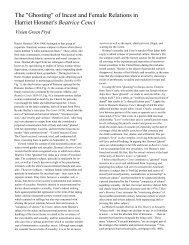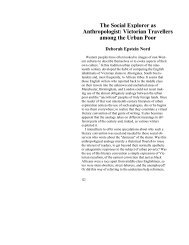The dissertation of Kelley, IHM, MS_________________ entitled ...
The dissertation of Kelley, IHM, MS_________________ entitled ...
The dissertation of Kelley, IHM, MS_________________ entitled ...
You also want an ePaper? Increase the reach of your titles
YUMPU automatically turns print PDFs into web optimized ePapers that Google loves.
Grief in Women Religious 24<br />
as .79 (p < .001; Costa & McCrae, 1992). In the present study, a coefficient alpha <strong>of</strong> .91<br />
was found for the NEO-E.<br />
Spirituality. Spirituality was measured using the Spiritual Well-Being Scale<br />
(SWB; Paloutzian & Ellison, 1982). <strong>The</strong> SWB scale gives a global assessment <strong>of</strong> the<br />
subjective spiritual quality <strong>of</strong> life (see Appendix E). Paloutzian and Ellison (1991) state<br />
that the term "spiritual well-being" reflects people's meaning <strong>of</strong> spirituality as "either<br />
their relationship with God or what they understand to be their spiritual being, or their<br />
sense <strong>of</strong> satisfaction with life or purpose in life" (p.2). <strong>The</strong> SWB total score presents a<br />
general measure <strong>of</strong> an individual's spiritual well-being. Additionally, the SWB contains<br />
two subscales. <strong>The</strong> Religious Well-Being score (RWB) provides an assessment <strong>of</strong> an<br />
individual's relationship with God and the individual's perceived satisfaction with God.<br />
<strong>The</strong> Existential Well-Being (EWB) score assesses an individual's satisfaction with and<br />
purpose in life (Paloutzian & Ellison, 1991).<br />
<strong>The</strong> SWB is a 20-item self-administered instrument Responses are given on a 6-<br />
point Likert scale ranging from "strongly agree" to "strongly disagree." RWB is assessed<br />
by the ten even-numbered statements that contain the word "God" and the ten remaining<br />
odd numbered items assess EWB (Paloutzian & Ellison, 1991). In an attempt to control<br />
for response bias, about half <strong>of</strong> the items are worded in a negative fashion. <strong>The</strong><br />
statements are scored from 1 to 6. For positive items, a higher number represents greater<br />
well-being, and the negatively worded items are reverse scored. <strong>The</strong> sum <strong>of</strong> all 20 items<br />
assesses overall spiritual well-being (Paloutzian & Ellison, 1991).<br />
Bufford, Paloutzian, and Ellison (1991) found high reliability for the SWB in four<br />
test-retest studies. <strong>The</strong> reliability coefficients ranged from .88 to .98 for RWB, .73 to .98


